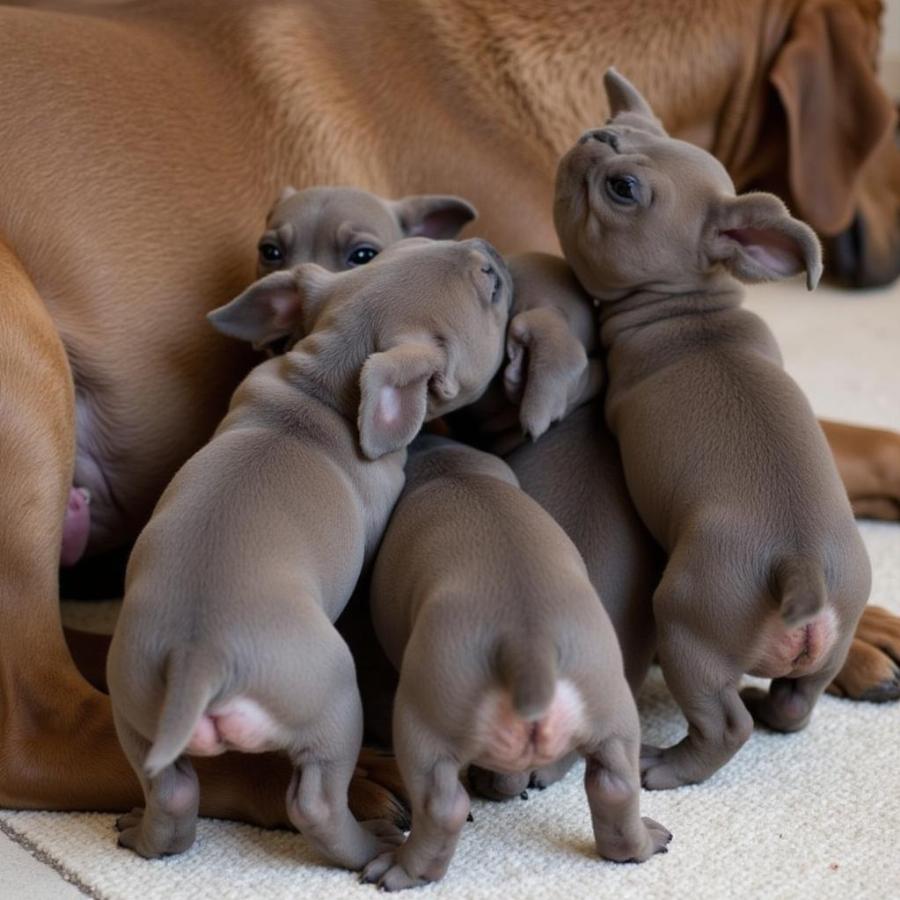Pitbulls, known for their loyalty and muscular build, are a popular breed. If you’re considering breeding your Pitbull or are just curious about litter sizes, you’ve come to the right place. So, how many puppies can a Pitbull dog have? While the average litter size is around five to ten puppies, this number can vary significantly. Let’s explore the factors that influence litter size and what you need to know about responsible Pitbull breeding.
Factors Influencing Pitbull Litter Size
Several factors play a role in determining how many puppies a Pitbull will have. These include the mother’s age, health, genetics, and even the specific father.
The Mother’s Age and Health
A Pitbull in her prime breeding years, typically between two and five years old, is likely to have larger litters than a younger or older dog. A healthy mother, free from underlying medical conditions, is also more likely to have a successful pregnancy and a larger, healthier litter.
Genetics and the Father
Just like humans, genetics play a significant role in litter size. Some Pitbull bloodlines tend to have larger litters than others. The father’s genetics also contribute to the equation. If he comes from a line known for large litters, the chances of a larger litter increase.
Nutrition and Care During Pregnancy
Proper nutrition and prenatal care are crucial for a healthy pregnancy and optimal litter size. A pregnant Pitbull requires a high-quality diet rich in essential nutrients to support the developing puppies. Regular veterinary checkups are also important to monitor the pregnancy’s progress and address any potential complications.
What’s the Largest Pitbull Litter Ever Recorded?
While the average Pitbull litter is five to ten puppies, exceptionally large litters have been documented. The largest recorded Pitbull litter consisted of 18 puppies! However, such large litters are rare and can pose risks to both the mother and the puppies.
Potential Complications with Large Litters
Large litters can strain the mother’s resources, making it difficult for her to provide adequate milk and care for all the puppies. This can lead to smaller, weaker puppies and potential health complications for the mother.
Preparing for a Pitbull Litter
Preparing for a Pitbull litter is a significant undertaking. It involves ensuring the mother’s health, creating a safe and comfortable whelping area, and being prepared for the demands of newborn puppies.
Whelping and Postnatal Care
The whelping process, when the mother gives birth, can be stressful for both the dog and the owner. It’s essential to have a veterinarian on call and be prepared for potential complications. Postnatal care involves ensuring the puppies are nursing properly, monitoring their weight gain, and providing a clean and warm environment.
 Pitbull Puppies Nursing
Pitbull Puppies Nursing
Responsible Pitbull Breeding
Breeding Pitbulls should be approached with careful consideration and responsibility. It’s crucial to prioritize the health and well-being of both the mother and the puppies. If you’re considering breeding your Pitbull, consult with a veterinarian and a reputable breeder.
Finding Good Homes for the Puppies
Finding suitable homes for the puppies is another crucial aspect of responsible breeding. Screen potential owners carefully to ensure they can provide a loving and responsible home for a Pitbull.
Conclusion
The number of puppies a Pitbull can have varies depending on various factors, including the mother’s age, health, and genetics. While the average litter size is five to ten, larger and smaller litters are possible. Responsible breeding practices and proper care are crucial for the health and well-being of both the mother and her puppies. Remember, breeding Pitbulls is a significant commitment and should be approached with careful consideration and planning.
FAQ
- What is the average lifespan of a Pitbull? Pitbulls typically live between 12 and 15 years.
- How much exercise does a Pitbull need? Pitbulls are energetic dogs and require at least 60 minutes of exercise daily.
- Are Pitbulls good family dogs? With proper training and socialization, Pitbulls can make loving and loyal family pets. what dog am i test
- What kind of food should I feed my Pitbull puppy? A high-quality puppy food formulated for large breeds is recommended. dog food for puppy pitbulls
- How often should I groom my Pitbull? Pitbulls have short coats and require minimal grooming, typically a weekly brushing.
- Are Pitbulls prone to any health problems? Like all breeds, Pitbulls can be susceptible to certain health issues, such as hip dysplasia and skin allergies.
- How do I find a reputable Pitbull breeder? Research breeders carefully, ask for references, and visit their facilities to ensure they prioritize the health and well-being of their dogs. pitbull mastiff dog
Further Reading
For more information on Pitbulls and other dog breeds, check out these articles: chew toys for small dogs, how many bones in a dog
Beaut Dogs: Your Ultimate Resource for Canine Companions
Beaut Dogs is your one-stop shop for all things canine, providing reliable and in-depth information on the fascinating world of dogs. From breed characteristics and care guides to product recommendations and expert advice, we’re here to help you navigate the joys and responsibilities of dog ownership. When you need assistance, please contact us via Email at [email protected], and Beaut Dogs will be happy to provide detailed and accurate answers. Visit https://beautdogs.com today to learn more!